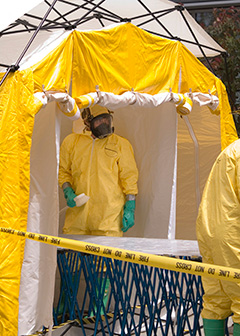
Most employers prefer applicants who have at least an associate’s degree in nuclear science or a nuclear-related technology.
Nuclear technicians typically enter the occupation with an associate’s degree in nuclear science or a nuclear-related technology. Nuclear technicians also go through extensive on-the-job training.
Education
Nuclear technicians typically enter the occupation with an associate’s degree. Many community colleges and technical institutes offer associate’s degree programs in nuclear science, nuclear technology, or related fields. Students study nuclear energy, radiation, and the equipment and components used in nuclear power plants and laboratories. Other coursework includes mathematics, physics, and chemistry.
Training
In nuclear power plants, nuclear technicians start out as trainees under the supervision of more experienced technicians. During their training, they are taught the proper ways to use operating and monitoring equipment. They are also instructed on safety procedures, regulations, and plant policies.
Training varies with the technician’s previous experience and education. Most training programs last between 6 months and 2 years. Throughout their careers, nuclear technicians take additional training and education to keep up with advances in nuclear science and technology.
Important Qualities
Critical-thinking skills. Nuclear technicians must carefully evaluate all available information before deciding on a course of action. For example, radiation protection technicians must evaluate data from radiation detectors to determine if an area is unsafe and then must develop a decontamination plan to handle the situation.
Listening skills. Nuclear technicians receive complex instructions from scientists and engineers that they must follow exactly. They have to be able to ask questions to clarify anything they do not understand.
Math skills. Nuclear technicians use scientific and mathematical formulas to analyze experimental and production data such as reaction rates and radiation exposures.
Monitoring skills. Nuclear technicians must be able to assess data from sensors, gauges, and other instruments to make sure that equipment and experiments are functioning properly and that radiation levels are controlled.
Speaking skills. Nuclear technicians must be able to explain their work to scientists, engineers, and reactor operators. They also must instruct others on safety procedures and warn them when conditions are hazardous.
Licenses
Although nuclear technicians do not need to be licensed, they may need to obtain security clearances for positions at nuclear power plants and nuclear research facilities that involve doing work related to nuclear weapons and national defense.
Advancement
With additional training and experience, technicians may become nuclear power reactor operators at nuclear power plants. Technicians can become nuclear engineers by earning a bachelor’s degree in nuclear engineering. Nuclear physicists need a Ph.D. in physics. For more information, see the profiles on power plant operators, distributors, and dispatchers; nuclear engineers; and physicists and astronomers.












